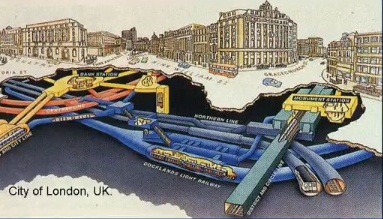Foodtubes Proposes Underground ‘Physical Internet’

Automatically routed canisters could replace lorries with an Internet of things, says Foodtubes
A group of academics is proposing a system of underground tunnels which could deliver food and other goods in all weathers with massive energy savings.
The Foodtubes group wants to put goods in metal capsules 2m long, which are shifted through underground polyethylene tubes at speeds of up to 60 miles per hour, directed by linear induction motors and routed by intelligent software to their destinations.
The group, which includes an Oxford physics professor and logistics experts, wants £15 million to build a £5 mile test circuit, and believes the scheme could fund itself if used by large supermarkets and local councils, and could expand because it uses an open architecture.
Underground tubes and linear motors
 “In the long term, we could see an ostrich slaughtered in Cape Town, and delivered to Edinburgh.” said Noel Hodson, Foodtubes’ CEO and a project planner.
“In the long term, we could see an ostrich slaughtered in Cape Town, and delivered to Edinburgh.” said Noel Hodson, Foodtubes’ CEO and a project planner.
On a more practical scale, the group has developed a plan for the London borough of Croydon, which would link all the food outlets, schools and other major buildings in the London borough of Croydon. “It would cost £400 million to build and, if run by the council or a consortium, it would make £80 million a year,” said Hodson, who says Transport for London has also expressed an interest.
The proposal uses lightweight capsules, which are roughly the same size as the cages that are carried by supermarket lorries, Hodson explained. They are moved by an electromagnetic “kick” from linear induction motors built into the side of the underground tubes and, at junctions, are steered one way or another by other linear motors operating under computer control.
The group moved to linear induction motors, when it realised that vacuum power, normally used in smaller capsule transport systems, would be impractical on this scale.
Energy efficient
The energy savings over road distribution would be huge, since around 92 percent of the diesel burnt by a lorry is used to transport the vehicle itself, which spends much of its time driving around almost empty. As well as this, increasing amounts of the electricity used by the system could come from green sources, said Hodson.
“It’s a difficult project to take forward, as it is innovative and involves new infrastructure,” said Hodson, in something of an understantement. “Governments shudder at getting involved, and research and development funding is scarce.”
However, he believes that a couple of large retailers would be enough to get it off the ground. “We do have communications with a major supermarket group,” he said.
Other members of the team include Fred Taylor, Halley professor of physics at Oxford University, and logistics consultant Jonathan Carter, who lectures at Imperial College London.
The idea could play well with ideas from IBM, which addressed green transport at its Start summit earlier this year and HP which wants to instrument the world with trillions of sensors.
Ironically, however, the first interest may come from companies who stand to suffer if lorries are made obsolete. Foodtubes is talking to two oil firms about providing a system to supply remote stations in the permafrost of Canada, and in the deserts of the Middle East, said Hodson.